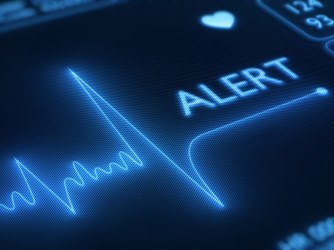Boston Scientific, Penn State's Cardiac Sensor System Predicts Heart Failure Events

Sensor technology attached to cardiac implants can successfully predict heart failure events 70 percent of the time, according to an international team of scientists that included representatives from Boston Scientific and Penn State Medical Center. Using multiple measurements of heart physiology — such as breathing and heart rate — researchers were able to use an algorithm to track worsening conditions and alert clinicians up to one month in advance of a hospitalization.
CDC estimates put the annual cost of heart failure on the U.S. economy at $30.7 billion, and lowering hospital readmission rates has been targeted by both public and private payers as a way to reduce the strain of those healthcare costs. According to a study published in Circulation, more than one million patients are hospitalized with heart failure each year, and approximately 50 percent are readmitted within six months.
Heart failure patients are typically monitored with myriad physical tests and exams by physicians, who look for signs of deterioration and attempt to predict potentially dangerous events. A research team centered at Penn State Medical Center researched a system of sensors — developed by Boston Scientific and dubbed HeartLogic — that can attach to defibrillator devices, monitor vital signs, and alert a physician if the patient becomes symptomatic. The system’s algorithm is based on data collected from 500 heart failure patients.
A recent clinical study — led by John Boehmer, director of the Heart Failure Program at the Penn State College of Medicine — tested the system in 900 patients, who were followed for one year following hospitalization with heart failure. Researchers were hoping that the system could detect 40 percent of heart failure events, but their research demonstrated 70 percent accuracy approximately 34 days in advance of the event. Though there were some false positives, they were within “an acceptable range,” said researchers in a press release.
HeartLogic “integrates a number of measurements of what’s going on with the patient, including breathing, activity and heart sounds, and puts that all together to give us an index that we believe is both sensitive and specific for heart failure,” explained Boehmer. “If you’re going to monitor a hundred heart patients, it becomes fairly manageable number of alerts that you have to deal with.”
Boehmer added that the study illustrated “compelling performance” of the HeartLogic system that would form the basis of future studies. Results from the recent clinical study have been submitted to European regulators for CE Mark consideration, and were presented by Boston Scientific at the American Heart Association Scientific Sessions 2016 in New Orleans.
“The successful results from this study and the development of the HeartLogic service are foundational to our continued development of differentiated solutions for the management of heart failure,” said Kenneth Stein, senior VP and CMO of Global Health Policy and Rhythm Management at Boston Scientific, in a separate press release.
Philips and the Mayo Clinic recently launched an expedition up Kilimanjaro to study the effects of heart failure on human physiology, using Philips’ remote monitoring equipment. Philips also recently launched a suite of digital services that takes aim at the treatment and prevention of chronic illness.
